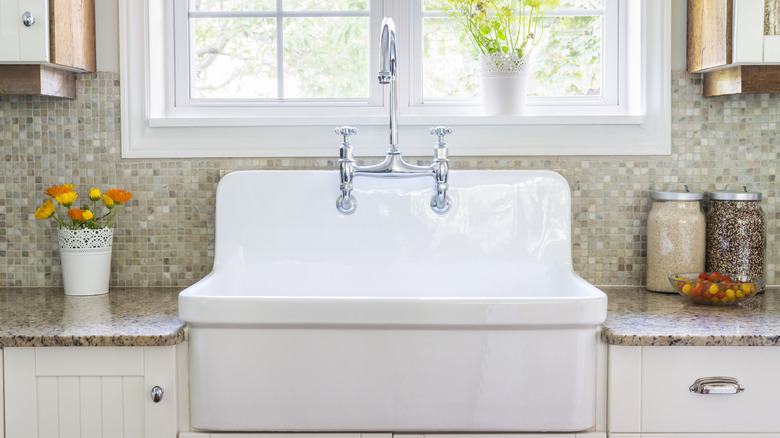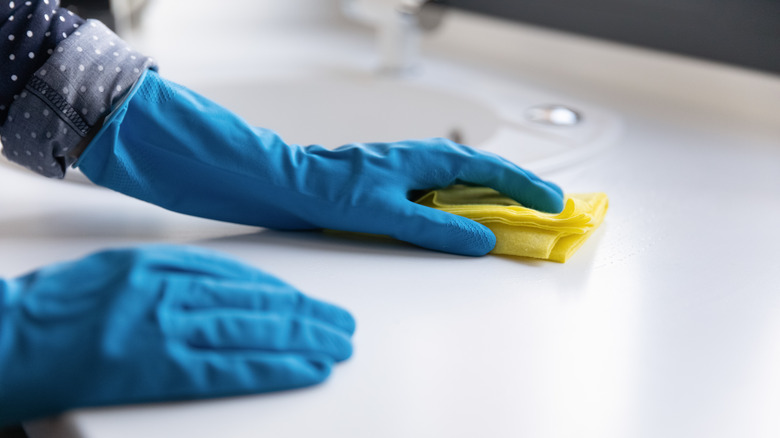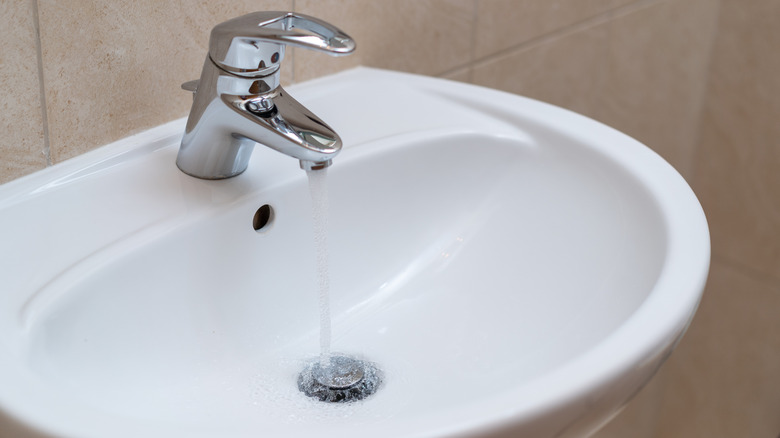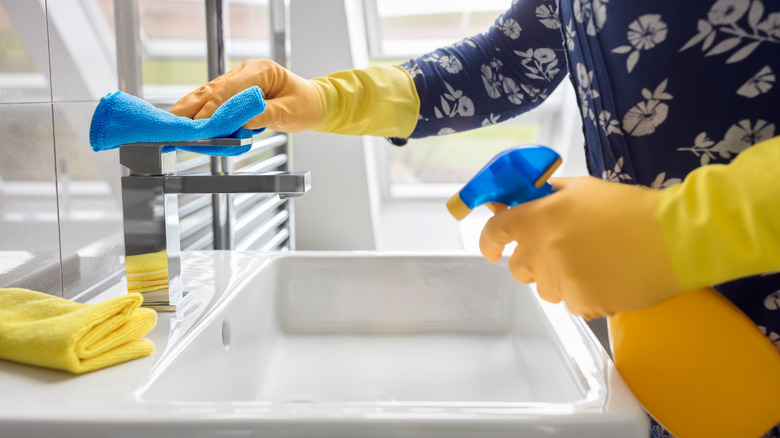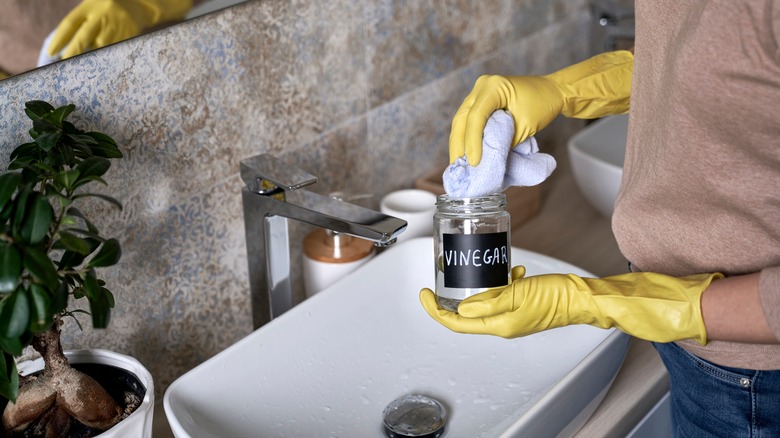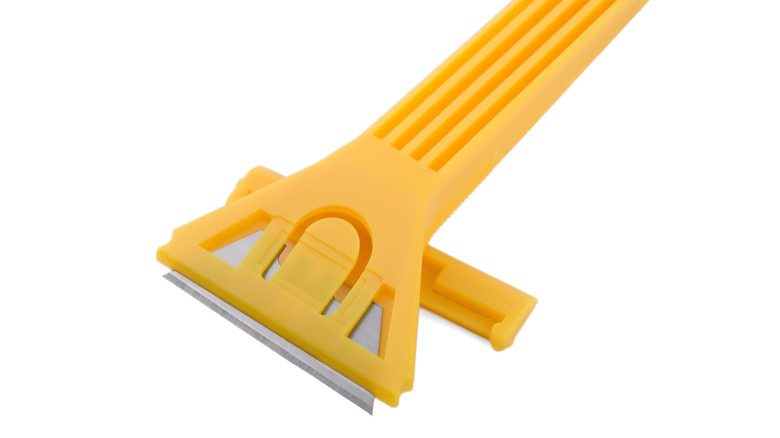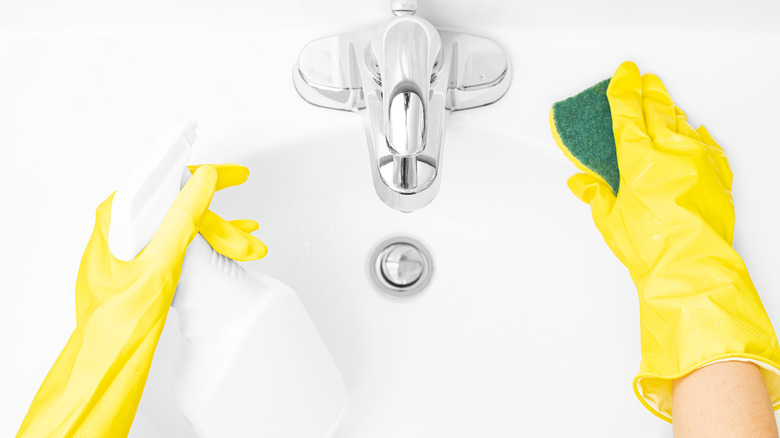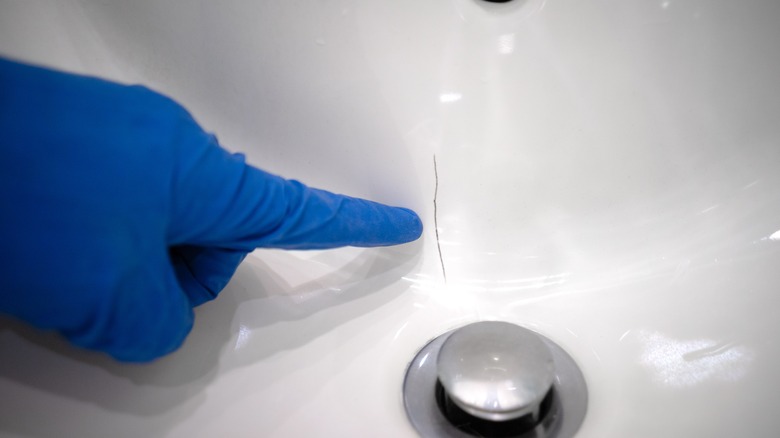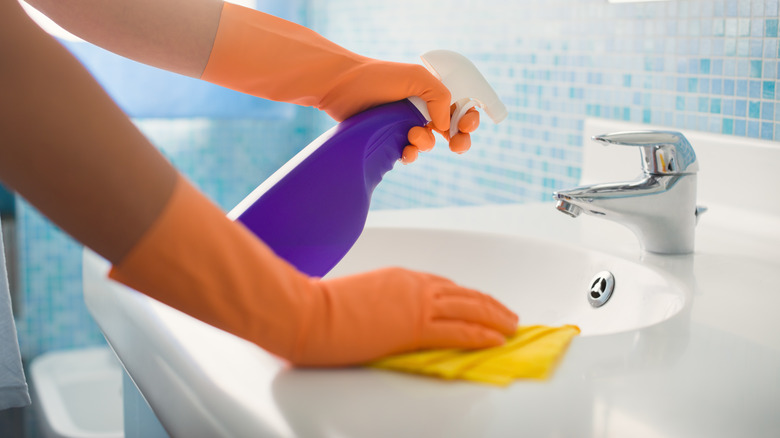Key Tips For Cleaning A Porcelain Sink
The sinks in your home get used daily and quite frequently. They endure all sorts of grease, stains, debris, and splatter, which means cleaning them thoroughly should be a high priority. Think of how many times you use your sink in a single day. Depending on the type of sink material you have, cleaning it requires different products and techniques. Porcelain sinks, for example, need to be cared for differently than stainless steel sinks.
According to Cosmo Surfaces, porcelain sinks are more common in bathrooms, though some kitchens have them. This is because porcelain is easily customizable and is often installed because of its durability and versatility. Porcelain actually increases the value of your home because of another major perk they have: they're easy to clean. This means that most cleaning solutions will work on them, though you still need to avoid certain ones. There are a few major things to know when it comes to cleaning porcelain sinks and we've got you covered.
Use a gentle sponge or microfiber cloth
The finishing touch on porcelain sinks is a glaze that gives them that smooth appearance. This glaze also makes the sink non-porous, which means it's easy to wipe up any messes that you notice. However, this glaze means porcelain scratches easily and so the item you use to clean it with should be non-abrasive. Never use a scouring pad or steel wool when cleaning a porcelain sink as they will ruin the glaze. Your best product for this method is a simple sponge or microfiber cloth.
Microfiber cloths are made from super-fine yarn that makes them incredibly absorbent, as noted on Grove Collaborative. But if all you need to clean porcelain is something smooth, why not use a cotton towel or rag instead? While cotton is cheaper and more accessible, it doesn't trap dirt and dust as well as microfiber. Cotton, essentially, moves the dirt around whereas microfiber catches it. So when restocking your porcelain cleaning supplies, opt for microfiber cloths or a sponge over cotton as this will ensure a more thorough and long-lasting clean.
Use the hottest water possible
Hot water is ideal for all sorts of cleaning, from mopping floors to wiping down a shower wall. But it's even more highly efficient when cleaning your porcelain sink. According to Racold, hot water is best for cleaning, primarily because the molecules, when heated, move faster and dispel a large amount of kinetic energy. This process, when combined with a powerful cleaning product, makes removing stains, grime, or dirt a breeze. And since porcelain can withstand all types of water temperatures without fear of ruining the glaze, don't be afraid to use the hottest water possible when cleaning it.
But before you start cleaning your porcelain sink, here are a few things to know about what exactly hot water can and cannot do. As reported by Sunrise Cleaning, hot water is great for cutting through grease, but it doesn't kill germs unless it's boiling. The best way to keep germs and bacteria under control in your sink is to clean it regularly. Hot water also doesn't lift dirt, but it can help dissolve it thanks to those expanding molecules we mentioned before. So while hot water is a fabulous cleaning solution for tough stains, it's important to know that you will still need to pair it with some other product to ensure a more thorough clean.
Use non-abrasive cleaning products
We mentioned earlier not to use any non-abrasive cleaning pads on your porcelain sink and the same attention must be paid to your cleaning products as well. Have you ever noticed how certain products in the store say they're for specific surfaces or rooms? That's because the types of chemicals used to create them were designed specifically for that surface or area. This is important to pay attention to, especially if you're using one to clean your porcelain sink as some chemicals may be harmful to it.
According to My House Cleaning Biz, too often people use the wrong product on surfaces and they end up doing more harm than good. Where they think they're cleaning, they're actually damaging. When it comes to cleaning your porcelain sink, steer clear of any products like Comet or even Magic Erasers. These abrasive materials could do permanent damage to the porcelain if you're not careful. A simple cleaning product that works wonders on porcelain is dish soap. Even the smallest amount can scrub away tough stains and is gentle to use.
Use everyday household items for easy stain removal
If you're not sure whether or not your current cleaning products are abrasive, there are plenty of at-home remedies you can use to clean your porcelain sink. In fact, different combinations of items like vinegar, baking soda, lemon juice, and bleach can work wonders as well as any cleaning product. This solution is ideal for anyone who wants to avoid toxic chemicals in their home or is on a budget. Vinegar and lemons are far cheaper than specialized cleaning products.
Depending on the type of stain or shine you want your porcelain to have, you'll have to try different combinations to see what works best. For example, vinegar and lemon combined will not only remove stains but give the porcelain a nice shine once wiped away. Hunker also recommends combining baking soda, vinegar, dish soap, and water into a spray bottle for a powerful all-purpose cleaner that's especially potent in bathrooms. Be careful with using baking soda on its own since it's a mild abrasion. If you plan on using it to clean porcelain, use a small amount and mix it with either vinegar, hot water, or lemon juice.
Use a razor blade for tough buildup
There will be times when your porcelain gets stains that no matter what you use, it won't budge. This doesn't mean it's stuck on there forever. It'll simply require a different tool to help you, and that tool is a razor blade. Razor blades are safe to use on porcelain, so long as you use them correctly and sparingly. If you clean your sink regularly, you shouldn't have to rely on this method much but if your area has hard water, this is where this process comes in handy.
According to Shay's Cleaning Co., razor blades are ideal for removing hard water and tough stains, and can even be used to clean the edges and hard-to-reach creases of your sink. You'll want to first use some kind of cleaning solution to loosen up the stain and then use the razor blade to lift up the rest. Focus on getting as far under the stain as possible with the blade, using a tilting approach rather than straight down. It may take a few tries and if you happen to leave a few black marks on the surface, they can be easily removed with some soap and hot water.
Use a re-glazing kit for shine
We said earlier that porcelain sinks get their popular shine from a top coat glaze. This glaze makes them easy to clean because it produces a smooth surface. But over time, the glaze can and will fade. This is especially true if you use abrasive materials or products on the porcelain. The glaze protects the porcelain from scratches and when it begins to fade, that's when your sink is more prone to permanent damage. If you want to ensure your sink remains easy to clean, consider re-glazing it every few years.
According to Reglazing NYC, adding a new layer of glaze may not seem worth it, particularly since it takes a while for the glaze to fade, but it can actually save you money down the line. This is because you may not know when the glaze is going until you notice stains or damage to your sink. By then it's already too late and you'll need to hire a professional to come and repair the porcelain. That's why taking time to re-glaze your porcelain every other year isn't a bad investment to make and you have options. You can either buy a re-glazing kit and do it yourself or hire a professional. Either way, you'll save yourself a ton of unnecessary repairs and keep your sink shining like new.
Use car wax to avoid scratches
One of the best things you can do when cleaning your porcelain sink is to add some preventive care such as protecting it from future scratches. While regular cleaning will help here, there is another method you can try that will provide longer-lasting protection, and that's using car wax. As Kniese's Plumbing notes, despite the many advantages of porcelain sinks, one major drawback is their ability to scratch easily. But since porcelain is a timeless classic and comes in a variety of colors, its use in homes isn't going anywhere so you'll need to get crafty with how you protect it.
Your bathroom sink, for example, can get scratches from curling irons and other hair tools that come in contact with the surface. Your kitchen sink is constantly bombarded with dishes, silverware, and food scraps. Modern Bathroom recommends using bleach to help remove scratches if that's your primary concern. Simply fill the sink with warm or hot water, add two cups of bleach, and let it soak overnight. Once it's drained and cleaned, add a small amount of car wax to the basin and around the surface if you'd like. Less is more with this method. You're simply coating the surface and once it's dry, you'll have an extra layer of protection plus a shiny sink.
Clean your sink every 1-2 weeks
As we already mentioned, regular cleaning of your porcelain sink is the best way to maintain its durability and shine. But how often should you clean it? The Daily Mail recommends a deep cleaning every 1 to 2 weeks. This is mainly because your sink is used on a daily basis and this doesn't matter if it's your kitchen or bathroom sink. It's still used a lot throughout the day. Dirt, soap scum, and stains collect in your sink and if they're not cleaned properly, they can cause tough buildup and bacteria to grow.
A good habit to pick up is wiping your sink down daily at the end of each night. Simply use a microfiber cloth and a dash of dish soap to give the porcelain a quick rinse. This will help you stay ahead of stains as well as keep germs at bay. If deep cleaning every other week is too much for you, an expert from Insider recommends a thorough sink clean at least once a month. No matter when you choose to deep clean your sink, it's important to follow these tips, especially with porcelain, as they will help keep its shine and prevent scratches from permanently damaging it.
